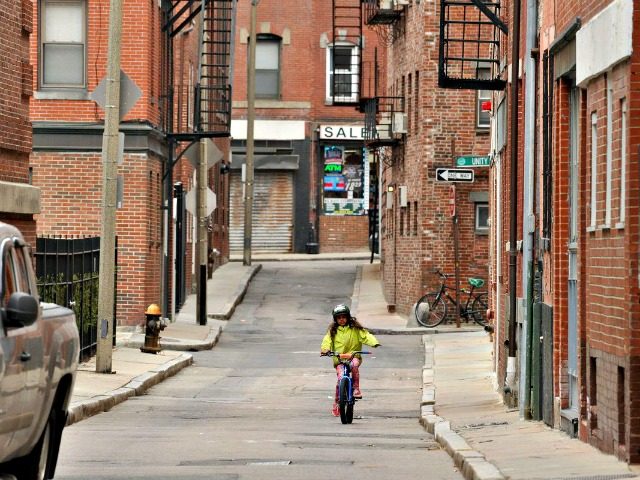Over 2,100 U.S. cities are expecting significant budget shortfalls this year, a testament to the widespread financial woes that the novel coronavirus pandemic and the associated mitigation efforts may trigger, a survey of local officials released Tuesday revealed.
In response to the prospective financial havoc, many of the cities are planning to cut public service programs and slash staff, including local police departments and other public safety agencies, the Washington Post and other news outlets reported.
The news outlets cited a survey of 2,400 local officials conducted by the National League of Cities (NLC), in collaboration with the U.S. Conference of Mayors. Researchers found that 88 percent (an estimated 2,112) of the local officials “anticipate the pandemic will lead to painful reductions in revenue this year” that will likely trigger cuts to services, worker furloughs, and layoffs, the Associated Press (AP) noted.
Today, we are releasing a survey w/ @usmayors that shows 88% of local leaders anticipate the #COVID19 pandemic will lead to painful reductions in #revenue this year. Cities, towns & villages need addl federal support & guidance to support our residents. https://t.co/5oi2Uj1WNt
— National League of Cities (@leagueofcities) April 14, 2020
Currently, at least 42 states and other jurisdictions across the country, together home to over 95 percent of the U.S. population of nearly 330 million, have implemented some variation of an unprecedented “stay at home” order for non-essential business personnel, a move that is having an impact on the finances of local and state governments.
On Monday, the White House Coronavirus Task Force did credit the mitigation efforts with keeping the coronavirus mortality rate low. Federal and state governments are already preparing to open the nation back up.
The survey of local officials found “many local governments are bracing for sharp declines in tax revenue as businesses shutter, workers lose their jobs in record numbers and tourism grinds to a halt,” the Post reported, adding:
The bleak outlook — shared by local governments representing roughly 93 million people nationwide — led some top mayors and other leaders to call for greater federal aid to protect cities now forced to choose between balancing their cash-strapped ledgers and sustaining the public services that residents need most.
…
Nearly nine in 10 cities surveyed — from smaller hubs with populations of fewer than 50,000 to the largest metropolitan areas in the country — signaled they expect a revenue shortfall. Among them, more than 1,100 cities are preparing to scale back public services, the survey found. Almost 600 cities predicted they may have to lay off some government workers amid the crunch. Local leaders in 1,000 cities said the reductions probably would affect their local police departments and other public safety agencies.
On Monday, President Trump suggested that more federal aid for states and local governments is not out of the question, telling reporters “certainly willing to look at that.”
Moreover, Trump acknowledged over the weekend that he had approved a disaster declaration for every state and most U.S. territories for the first time in American history in a bid to contain the coronavirus pandemic.
For the first time in history there is a fully signed Presidential Disaster Declaration for all 50 States. We are winning, and will win, the war on the Invisible Enemy!
— Donald J. Trump (@realDonaldTrump) April 12, 2020
The Federal Emergency Management Agency (FEMA) disaster declarations make federal funds available to states and territories to combat the coronavirus.
As part of the broader $2 trillion package that Trump signed into law in March, U.S. lawmakers also authorized $150 billion in aid for states and large cities plagued by the highly contagious and deadly coronavirus.
Many local leaders, however, reportedly consider the financial assistance insufficient to keep their jurisdictions running.
Referring to the restrictions associated with the aid, the Post noted:
Federal legislators apportioned the money only to assist local governments with their efforts to respond to the pandemic, not close the revenue gaps caused by the severe, sudden economic downturn. A senior Treasury official, speaking on condition of anonymity to discuss the planning, confirmed Monday the dollars “cannot be used to cover general budget shortfalls.”
The law reportedly charged state governments with doling out the money with direct federal assistance only available to large metropolitan areas.
On Saturday, the two leaders of the National Governors Association — New York’s Andrew M. Cuomo (D) and Maryland’s Larry Hogan (R) — urged Congress to allocate additional financial assistance for state governments.
The two governors declared in a joint statement:
Congress must appropriate an additional $500 billion specifically for all states and territories to meet the states’ budgetary shortfalls that have resulted from this unprecedented public health crisis. This critical stabilization funding for states must be separate from much-needed fiscal stabilization for local governments.
In the absence of unrestricted fiscal support of at least $500 billion from the federal government, states will have to confront the prospect of significant reductions to critically important services all across this country, hampering public health, the economic recovery, and — in turn — our collective effort to get people back to work.
The two governors suggested that even more funds may be needed if the federal government seeks to rescue the most financially-strapped cities and states.
As of the time this report was submitted for publication on Tuesday afternoon, the NLC had not responded to Breitbart News’ request for a copy of the survey, reportedly focused on the early economic effects of the coronavirus.

COMMENTS
Please let us know if you're having issues with commenting.